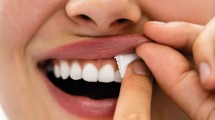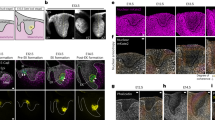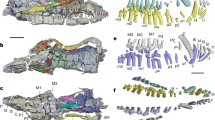Abstract
A FORM of parodontal disease has been previously described, in which the initial lesion of the gum was caused by the impingement and eventual penetration of salivary calculus1,2. Both tartar deposition and gingival disease were prevented by including in the diet short lengths of bone with small amounts of muscle, tendon and periosteum left in situ. The latter attachments fed separately had no prophylactic influence, and their importance lay in their providing the main inducement to gnawing of the bone by the animals. The tartar-preventing action of bone-gnawing was largely due to the mechanical friction of the hard bone against the tooth surfaces, and its curative effect on established parodontal lesions was also demonstrated.
This is a preview of subscription content, access via your institution
Access options
Subscribe to this journal
Receive 51 print issues and online access
$199.00 per year
only $3.90 per issue
Buy this article
- Purchase on Springer Link
- Instant access to full article PDF
Prices may be subject to local taxes which are calculated during checkout
Similar content being viewed by others
References
King, J. D., Brit. Dent. J., 77, 221, 245 (1944).
King, J. D., and Glover, R. E., J. Path, and Bact., 57, 353 (1945).
Author information
Authors and Affiliations
Rights and permissions
About this article
Cite this article
KING, J. Enamel Cuticle (Nasmyth's Membrane) and Tartar Deposition in the Ferret. Nature 156, 572–573 (1945). https://doi.org/10.1038/156572b0
Issue Date:
DOI: https://doi.org/10.1038/156572b0
Comments
By submitting a comment you agree to abide by our Terms and Community Guidelines. If you find something abusive or that does not comply with our terms or guidelines please flag it as inappropriate.



